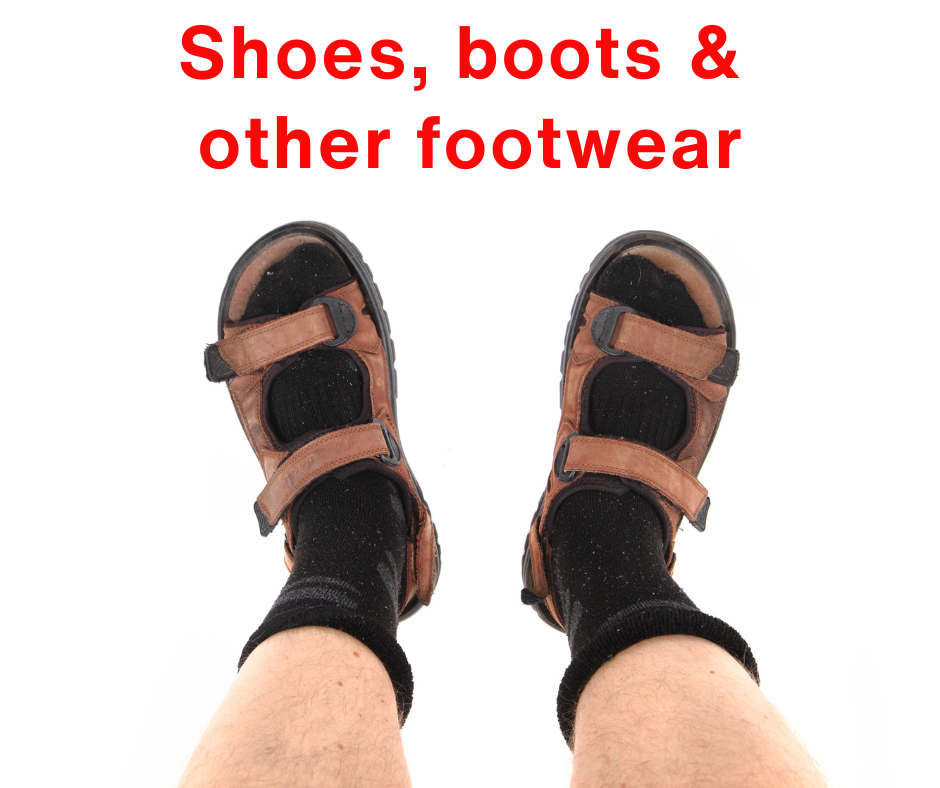
Put on your walking shoes, lace up your boots, or slip on your sandals – this episode is all about footwear!
We’ll explore lots of vocabulary for different shoe styles, from sneakers to stilettos so that you can boost your English skills, one step at a time.
Shoes
Shoes laces (to tie or do up)
The heel
The toe (cap)
The sole
The insole
The size: 8 (UK) = 42 (EU); 8.5 = 43; 9 = 43 (both 8.5 and 9 = 43!); 9.5 = 44; etc.
The width
The tongue
Sneakers (US) / trainers (UK): Comfortable, casual shoes often used for sports or everyday wear.
(High) Heels: Shoes with a raised heel, often worn by women for formal occasions.
Stilettos: Ladies’ shoes with a high heel.
Pumps: Women’s shoes with a low-cut front and usually a high heel.
Flats: Shoes with very thin or no heels, providing comfort and ease of movement.
Boots: Sturdy footwear that cover the ankle and sometimes the lower leg, suitable for various activities and weather conditions.
Ankle boots; knee-high boots; over-the-knee boots; thigh-high boots.
Riding boots: Boots used for riding horses
Hiking boots: Tough boots for hiking
Cowboy boots: Leather boots, with a pointed toe, that go a little above the ankle, usually lavishly embroidered
Waterproof boots – boots that keep your feet dry in wet weather.
Wellington boots: often called a “welly,” A type of waterproof boot made from rubber or plastic. These boots typically reach up to the knee and are designed to keep your feet dry in wet or muddy conditions. They were originally made from leather and were popularized by Arthur Wellesley, the 1st Duke of Wellington.
Other footwear
Sandals: Open-toed shoes with straps, ideal for warm weather.
Flip-flops: Simple sandals with a Y-shaped strap that goes between the toes.
Platforms: Shoes or boots with extremely thick soles and/or heels
Clogs: Shoes with a thick, often wooden sole, and an open back.
Slippers: Soft, comfortable shoes worn indoors.
Slip-on shoes/Slip-ons: Shoes without laces, which you slip on and off, like slippers
Plimsolls/Plimsoles/Pumps: Shoes with a canvas upper part and rubber sole. (Known in Wales and South-west England as Daps/Dappers, in Northern Ireland and central Scotland as Gutties, in some parts of Scotland as Sannies/Sand Shoes.)
Idioms
“Put oneself in someone else’s shoes”: To imagine how someone else feels in a difficult situation
“To be in someone’s shoes”: To be in the same situation as someone else
“The shoe/boot is on the other foot”: The situation has reversed
“To have big shoes to fill”: To have to meet high expectations set by the previous person in a role
“To shake in your boots”: To be very afraid of a situation
“To be a goody two-shoes”: To be overly good or virtuous.
“To pull yourself up by one’s bootstraps” To improve your situation through your own efforts.
“To get the boot.”: to lose your job
…and now it’s your turn to practise your English.
Send us a voice message. https://www.speakpipe.com/inglespodcast
Send us an email with a comment or question to [email protected] or [email protected]
If you’re a Spanish speaker and you want to study for free, visit the mansioningles website and for paid eBooks and audios for self-study check out the online store: https://store.mansioningles.net/
Thank you to our Patreon supporters. Join our Patreon program for as little as $1.50 per month and you get instant access to the transcriptions of this podcast. https://www.patreon.com/inglespodcast
Welcome to our new Patreon supporters who have joined us this month:
Jessica Negrier
Ronaldo Nino
Walter Zangue
In next week’s episode: A history of Philosophy in 30 minutes
If you enjoyed this podcast, please tell your friends.
The music in this podcast is by Pitx. The track is called ‘See You Later’




